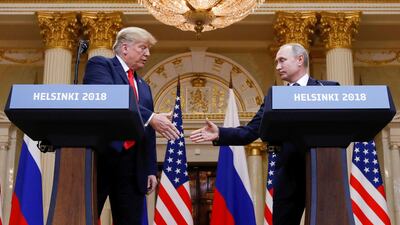Washington officials would need permission from Russia before releasing transcripts of calls between President Vladimir Putin and US leader Donald Trump, the Kremlin said.
Mr Trump is facing an impeachment inquiry over claims that he pressured Ukrainian President Volodymyr Zelenskiy to investigate his political rivals to benefit his 2020 bid for reelection.
US Democratic legislators say a transcript of a July 25 call between Mr Trump and Mr Zelenskiy is evidence that the US president pressured Ukraine to investigate political opponent Joe Biden in exchange for the release of $400 million in military aid.
House intelligence committee chairman Adam Schiff said Congress was determined to obtain transcripts of calls between Mr Trump and world leaders, including Mr Putin, over concerns that the US president might have undermined national security.
Kremlin spokesman Dmitry Peskov said Russia would be prepared to discuss the issue but releasing transcripts between world leaders was not standard diplomatic practice.
"Of course, their publication is to some extent only possible by mutual agreement of the parties," Mr Peskov said. "This is a certain diplomatic practice.
"To be more specific, perhaps, diplomatic practice in general does not envisage their publication. If there are some signals from the Americans, then we will discuss them."
The complaint against Mr Trump came from a whistle-blower within the US intelligence community.
It suggested that the president asked Ukraine to interfere in the 2020 presidential vote by investigating Mr Biden and his son’s business interests.
US special representative to Ukraine, Kurt Volker, resigned late last week amid the fallout after the impeachment inquiry was announced.
Mr Volker, a career foreign service officer who represented former president George W Bush at Nato, is believed to have organised a meeting between Mr Trump’s lawyer Rudy Giuliani and the newly elected Ukrainian government.
Mr Trump also asked Australian Prime Minister Scott Morrison to help investigate special counsel Robert Mueller's investigation into Russian interference in the 2016 election.
Critics say that was another incident in which Mr Trump used the influence of the presidential office for his personal gain.
"The Australian Government has always been ready to assist and co-operate with efforts that help shed further light on the matters under investigation," a spokesman said.
"The PM confirmed this readiness once again in conversation with the President."
Mr Mueller’s two-year investigation into ties between Russia and the Trump campaign “did not exonerate” the US president from allegations of obstruction of justice.
On Monday, the US Office of Foreign Assets Control put sanctions on two Russians believed to have links with the Internet Research Agency, a company with links to the Kremlin that is accused of spreading information on social media before the US elections.
Announcing the sanctions, US Treasury Secretary Steven Mnuchin said that the administration would "work tirelessly to safeguard our electoral process, and will aggressively pursue any other foreign actor that attempts to interfere in the 2020 elections".

